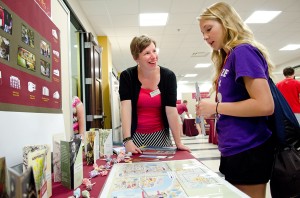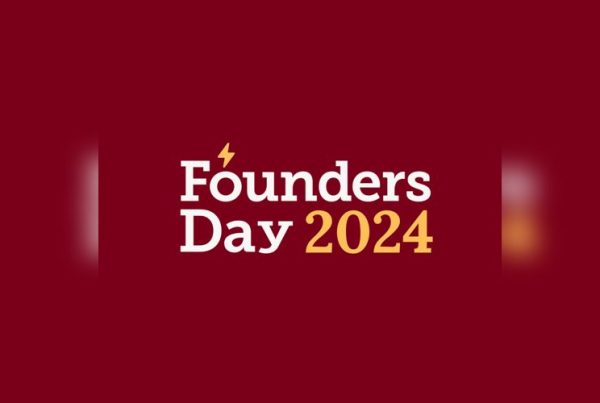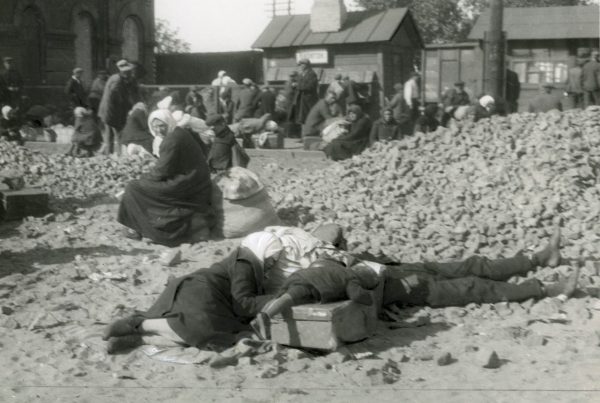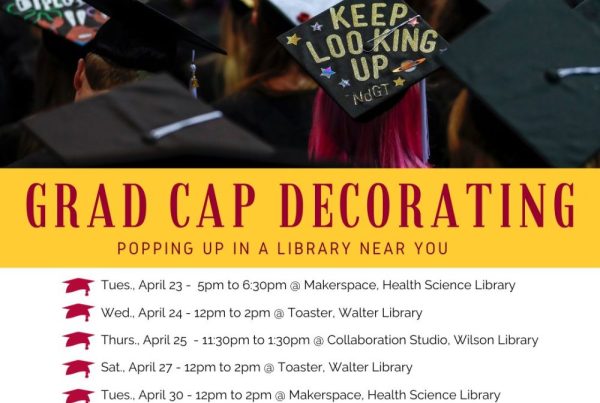By Allison Campbell-Jensen
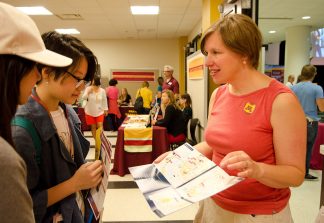
At orientation in 2017, Undergraduate Services Librarian Kate Peterson talks with incoming students about the value of the Libraries.
Until she had a light-bulb moment, Kate Peterson had not considered becoming a librarian. Now in her role as Undergraduate Services Librarian, she illuminates a path to the Libraries and what they offer to first- and second-year students and transfer students.
They frequently need to be introduced.
“One of the biggest challenges is the decline of school libraries, especially across the state of Minnesota but across the whole country,” Peterson says. “Many students might not have ever worked with a librarian or they might just be unfamiliar with a library and using the library website.”
At orientations and welcome events — and even in the one-credit course she teaches for the College of Science and Engineering in the fall — she’s introducing them to new resources that their tuition dollars pay for and they might not have been aware of previously.
In a one-credit College of Liberal Arts course in spring, she and three other librarians help new first- and second-year students and transfer students who seek to get involved in faculty-sponsored research. It’s challenging yet rewarding work.
Responsiveness is key
When managing student events, it’s important to be flexible, she says. At an orientation a couple of years ago, a colleague from the St. Paul campus, Shannon Farrell, turned to her and said, “The pony cannot take the stairs.” Peterson and the team successfully found an elevator that would get the mini pony from Pet Away Worry & Stress (PAWS) to the crowd of students outside on the lawn.
More seriously, in March 2020, when the Libraries closed their buildings because of COVID, many students assumed that was it — when the buildings closed, the Libraries are closed. Peterson had to try to persuade them otherwise, that “they can take all the skills that they know about doing searching and apply it to these tools they never used before.” They can use them to access online a wealth of databases, e-journals, and e-books.
“It’s really going to help them be successful because they are finding the sources that their instructors and professors are needing and wanting them to use,” she says.
Now she and a couple of colleagues are researching trauma-informed teaching principles, because staff at Boynton and other experts on campus say that COVID can be seen as a collective trauma. Having an awareness is important, Peterson says, and it leads to questions like: “Where can we meet them at, and how are we going to help them go forward? This will help us make better decisions about teaching, learning, and supporting student success.”
The route to rewarding work
“One of the biggest challenges is the decline of school libraries, especially across the state of Minnesota but [also] across the whole country”
—Kate Peterson
Peterson enjoys the give and take of librarianship. “Every day is always different because we get to chat with professors and graduate students and undergraduate students about all the different things they are interested in doing research about,” she says. “It’s always different, even a topic that I’ve talked with multiple students about, because they get to bring in their experiences.”
In library school, she loved working with students and was captivated talking with librarians. “It was always such fun to hear their stories.”
She did not travel to the University of Wisconsin-Madison’s library school in a straight line, however. Right after earning her biology degree at Gustavus Adolphus, she went to London and worked in a bakery for six months. She came back to Minnesota and worked on an employee benefits help line for Target and Dayton Hudson. Then she moved to Washington to be a nanny for relatives. She was looking through U.S. News & World Report online and ran across an article ranking library schools — and the light bulb came on for her!
She signed up to take the GRE that day and never looked back.
She worked in the engineering library during library school and distinctly remembers her first response to a reference question from a student. “I didn’t know anything about engineering,” she says, “but I was able to help them because I knew how the library tools worked.”
In a previous library job at St. Cloud State, she learned that she loves teaching. And at Capella University, an online institution, she understood that alongside books, there were many other resources a librarian could offer. Through it all, she has been keeping up with her changing profession and supporting the students, who sometimes just need a light along the way.


